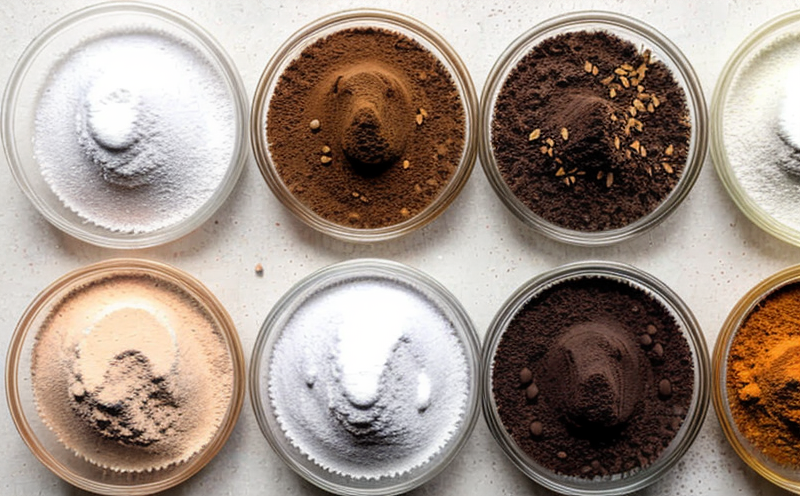ISO 39930 Curcumin Detection in Beverages
The ISO 39930 standard provides a robust and precise method for detecting curcumin, the primary active ingredient of turmeric, in beverages. This test is particularly important for ensuring compliance with dietary supplement regulations and consumer safety standards.
Curcumin, known for its anti-inflammatory properties and potential health benefits, can be added to beverages as a natural coloring agent or flavor enhancer. However, excessive or unregulated use of curcumin could lead to adverse effects on human health. Therefore, accurate detection is crucial to ensure that the concentration levels are within safe limits.
The testing process involves several steps, starting with sample preparation where beverages are thoroughly mixed and filtered to remove any solid particles. The filtrate is then analyzed using high-performance liquid chromatography (HPLC) for precise quantification of curcumin content. This method allows for the detection of even trace amounts of curcumin, ensuring accuracy and reliability.
The ISO 39930 standard specifies detailed procedures to ensure consistent results across different laboratories. Compliance with this standard ensures that the testing process is both reproducible and reliable. The HPLC technique used in this test allows for high sensitivity and specificity, making it an ideal choice for detecting curcumin in beverages.
Quality managers and compliance officers can greatly benefit from this service as it provides them with accurate data to ensure that their products meet regulatory requirements. R&D engineers also find value in this testing method as they can optimize formulations by understanding the exact concentration of curcumin needed for desired effects without exceeding safe limits.
| Sample Preparation | Analytical Technique | Data Analysis | Reporting |
|---|---|---|---|
| Thorough mixing and filtration to remove solid particles. | High-performance liquid chromatography (HPLC). | Data is analyzed for precise quantification of curcumin content. | Comprehensive reports including concentration levels and compliance status. |
Why Choose This Test
- Precise detection of curcumin in beverages.
- Ensures compliance with dietary supplement regulations.
- Avoids potential health risks from excessive or unregulated use of curcumin.
- Provides reliable data for quality management and R&D optimization.
The ISO 39930 test is essential for ensuring that beverages containing curcumin meet both regulatory standards and safety guidelines. By choosing this service, clients can gain confidence in the accuracy of their product formulations and compliance with international standards.
| Benefits | Advantages |
|---|---|
| Precise detection of curcumin levels. | Reduces the risk of regulatory non-compliance and potential health risks. |
| Comprehensive reporting for compliance verification. | Supports quality management and R&D optimization processes. |
International Acceptance and Recognition
The ISO 39930 standard for curcumin detection in beverages is widely recognized and accepted by regulatory bodies around the world. This international recognition ensures that the test results are universally applicable, making it easier for companies to navigate global markets.
By adhering to this standard, laboratories can ensure their testing methods are up-to-date with the latest scientific advancements and regulatory requirements. This not only enhances credibility but also supports a harmonized approach in quality assurance across different regions.
The acceptance of ISO 39930 by various countries underscores its importance in maintaining product safety and efficacy while meeting market demands. Regulatory bodies worldwide recommend or require the use of this standard to ensure that curcumin-containing beverages are safe for consumption.
International acceptance also facilitates easier trade between countries, as companies can rely on consistent testing methods across borders. This promotes a more efficient and transparent global supply chain, benefiting all stakeholders involved in the production and distribution of these products.
Use Cases and Application Examples
- Detecting curcumin levels in natural beverages to ensure compliance with dietary supplement regulations.
- Evaluating the effectiveness of formulations containing curcumin as a flavor enhancer or coloring agent.
- Monitoring the quality and consistency of products containing turmeric extracts.
The ISO 39930 test is applicable in various sectors including food, beverage, and healthcare. It ensures that the concentration of curcumin in these products meets safety standards set by regulatory bodies worldwide.
| Use Case | Description |
|---|---|
| Detecting curcumin levels in natural beverages. | Ensures compliance with dietary supplement regulations and consumer safety standards. |
| Evaluating the effectiveness of formulations containing curcumin as a flavor enhancer or coloring agent. | Supports R&D optimization by understanding the exact concentration needed for desired effects without exceeding safe limits. |





